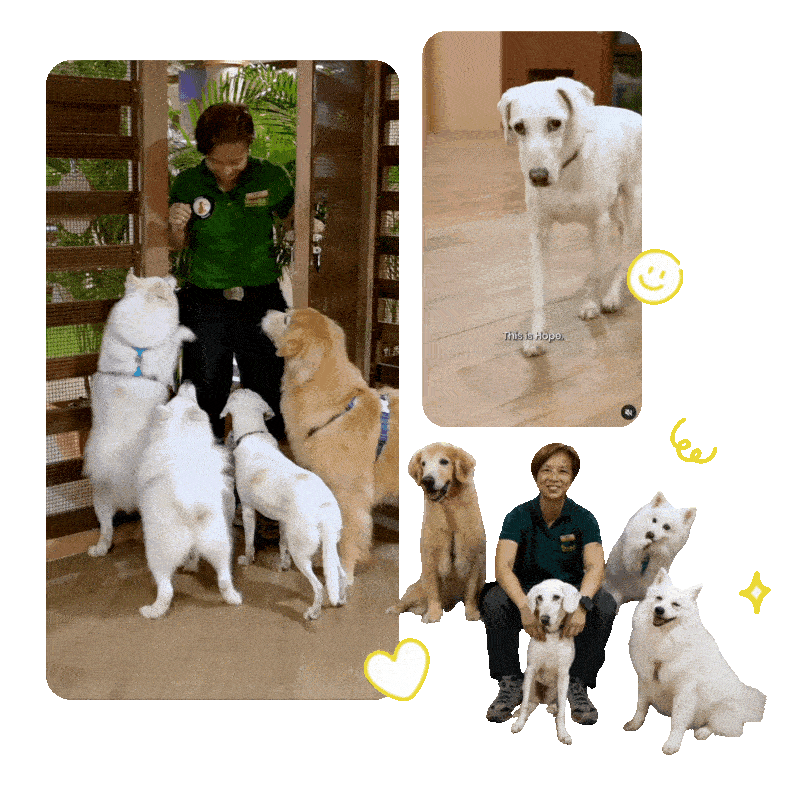Long-Term Barking Management Plan for Ted
Bark
Bark
🐾 Goals of This Plan:
Reduce barking intensity and frequency through structured training and reinforcement.
Teach Ted to disengage from triggers and redirect his focus appropriately.
Improve his ability to remain calm around other dogs and strangers.
Strengthen alternative behaviors to replace excessive barking.
Need a refresher on the previous Lesson?
Daily Routine for Ongoing Management
🕐 Morning:
Structured walk (10-15 minutes): Reinforce “Look at Me” when encountering other dogs or strangers.
Environmental management: Close curtains or use frosted window film to reduce exposure to outdoor triggers.
Mental enrichment: Provide a puzzle feeder or scent-based activity to start the day calmly.
🕐 Afternoon:
Training session (5-10 minutes): Reinforce "Settle on Cue" in a quiet setting.
Noise management: If external noises trigger barking, play soft background music or white noise.
Interactive play: Redirect excess energy through structured games (e.g., fetch or nose work).
🕐 Evening:
Controlled exposure to triggers: Practice desensitization to distant dogs or strangers while rewarding calm behavior.
Enrichment activity: Provide a chew toy or food puzzle to keep him engaged.
Weekly Training Structure
✅ Monday - Wednesday: Focus on Desensitization & Counterconditioning
Gradually expose Ted to distant triggers (dogs, strangers) while reinforcing quiet behavior.
Reward calmness when he notices but does not react to a trigger.
Practice structured focus training (“Look at Me”) in low-distraction environments.
✅ Thursday - Friday: Reinforce Focus & Redirection Techniques
Use a toy or treat to redirect his attention before barking at triggers.
Reinforce “Sit” or “Come” as an alternative behavior when a trigger is present.
Increase difficulty by introducing more distractions over time.
✅ Saturday - Sunday: Socialization & Confidence Building
Introduce controlled exposure to other dogs at a safe distance, rewarding calm interactions.
Rotate enrichment activities (sniff walks, puzzle toys) to keep his mind engaged.
Strengthen recall and impulse control exercises to build focus.
🐶 Need a helping paw?
Get personalized guidance from Natalie at an unbeatable price!
✨ Just $15 for a 20 minute 1-on-1 consult – because every good dog (and owner) deserves great advice! ✨
Ongoing Adjustments & Milestones
📌 Month 1-2: Reinforcement & Habit Formation
Keep training sessions short and reward early signs of success.
Establish a consistent management routine to minimize triggers.
Track barking incidents to monitor improvement patterns.
📌 Month 3-4: Increasing Difficulty & Generalization
Begin practicing redirection and focus exercises in more distracting environments.
Gradually expose Ted to real-life situations (e.g., passing dogs on walks).
Reinforce longer periods of calm behavior before rewarding.
📌 Month 5+: Maintenance & Preventing Regression
Continue rewarding quiet behavior but phase out frequent treats, relying more on praise and engagement.
If barking increases, revisit foundational training exercises.
Keep enrichment activities varied to prevent boredom-related barking.
Additional Support
🧩 Mental & Physical Enrichment
Rotate puzzle toys and interactive feeders to keep Ted engaged.
Use scent-based games and nose work to redirect his focus.
Ensure daily walks include structured engagement to prevent frustration.
🏡 Environmental Management
Maintain visual barriers (curtains, frosted windows) to reduce overstimulation.
Use background noise (music, white noise) to mask external sounds.
Provide a quiet space where Ted can relax away from triggers.
🌿 Stress Reduction Aids (if needed)
If anxiety-driven barking persists, consider calming supplements or pheromone diffusers.
Ensure Ted has a designated relaxation spot for downtime.
Barking Box – Keep Your Dog Busy & Happy!
Turn “woof woof” into “wow, this is fun!” with the Barking Box—a paw-some bundle designed to keep your pup entertained, engaged, and barking less! Packed with yummy treats, exciting enrichment toys, and easy-to-follow guides, it’s the perfect way to channel all that energy into positive play.
Keep your pup’s mind busy and their tail wagging!
Final Thoughts
Ted’s barking stems from frustration, social excitement, and alertness, so the key is teaching him alternative behaviors and rewarding calm responses. Through consistent training, environmental adjustments, and positive reinforcement, Ted will develop better impulse control and reduced reactivity, leading to a more peaceful and structured routine.
By following this plan with patience and consistency, Ted’s owner will see steady improvements in his ability to stay calm and focused. 🚀🐶





